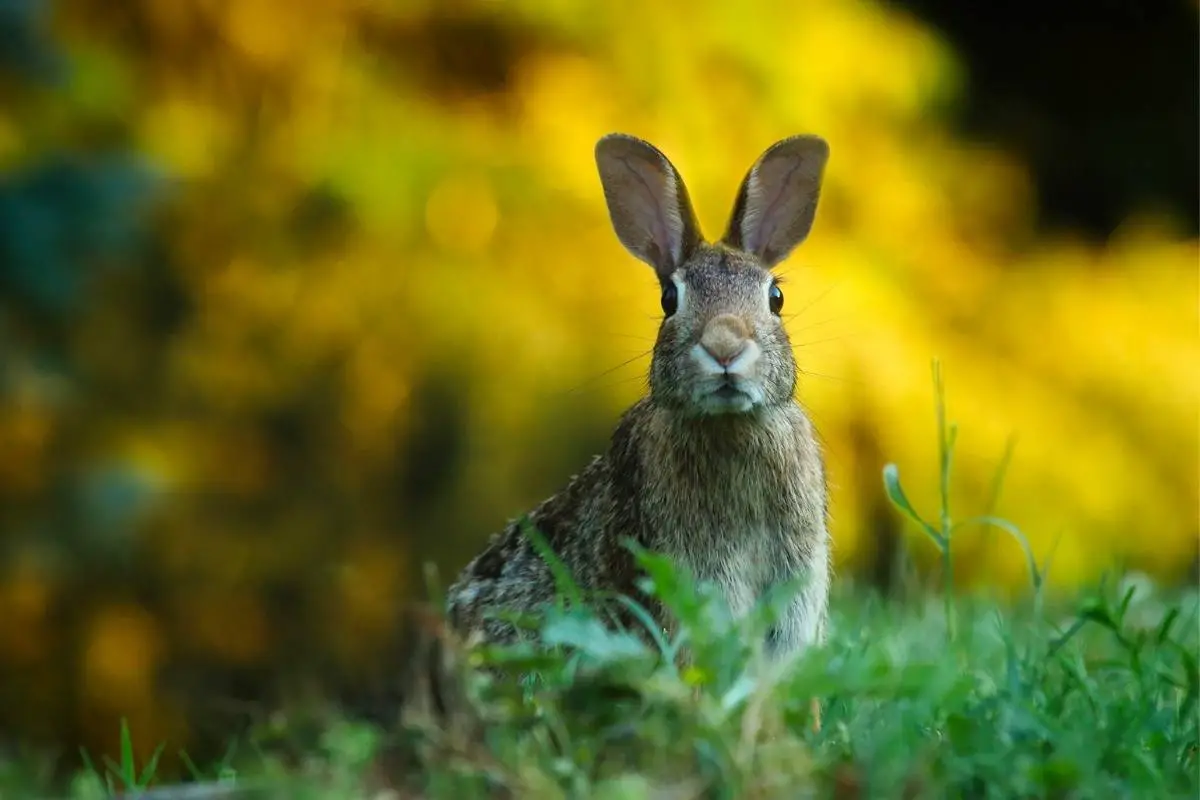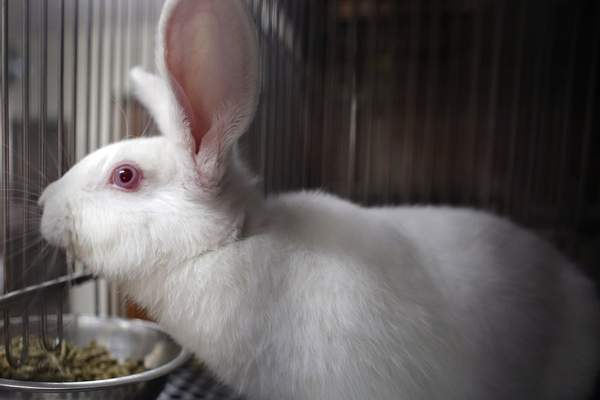Whether it’s a Flemish Giant or a Holland Lop, your pet rabbit is undeniably adorable. However, after spending several months with your fluffy pet, you may have noticed that the usual rabbit smell of hay or grass has been replaced by a smell that’s very similar to onions, skunk, or body odor, and you might very reasonably wonder why. After all, before now, your rabbit didn’t smell much at all, and now they smell quite strongly!
Why does my bunny smell like onions? When rabbits mature sexually, the scent glands on their rear end begin to release a strongly scented oily substance known commonly as musk. This onion-smelling substance lets other rabbits know that they are ready to mate.
This smell is not pleasant to humans, but is overall entirely harmless. Here you can learn more about how to reduce this smell, and what to do if the ‘rabbit funk’ becomes completely out of the ordinary.
Rabbits and Their Territory

All rabbits, whether domestic or wild, possess scent glands both under their chin and near their anus. The glands beneath the chin are generally there to mark their territory. You may see your rabbit hopping around and ‘chinning’ objects, or rubbing their face against things.
This is your rabbit depositing a unique smell that indicates to other rabbits that this area belongs to them. These scents are undetectable by human noses, and so these glands and scents shouldn’t be a bother to you or your rabbit at all.
The scent glands on your rabbit’s rear, however, can be problematic. These glands are used to indicate sexual maturity and availability to other rabbits, and they produce a very strongly scented waxy substance.
This ‘wax’ is what you are smelling when you smell onions from your rabbit. Some rabbits produce very little, and it’s hardly even noticeable, others produce a lot, and it can become a problem for both you and your pet. The rate of ‘wax’ production from the glands at the hind end of your rabbit depends on breed, age, and your rabbit’s overall health.
Rabbit Maturity and Musk
Most rabbits, both domestic and wild, reach maturity between three to six months of age, and at this time, they will begin producing musk to indicate to other rabbits that they are able to breed.
It may seem absolutely bizarre to us that rabbits mature this quickly, but it actually serves an evolutionary purpose: because rabbits are prey animals, they have evolved to reproduce extremely rapidly in order to keep their species alive.
If your pet rabbit has grown out of being a baby and has reached sexual maturity, it will likely begin producing this onion-y smell. If your pet is not fixed, the onion smell will likely be much stronger, and harder to overlook.
This is because your rabbit still possesses all their sexual anatomy. Therefore, your rabbit is functioning as normal, and so the smell will be quite powerful in order to let any rabbit in the area know that your pet, even if you are not interested in being the owner of more than one rabbit, is looking for a mate.
However, if your rabbit has been fixed, the smell will likely be less strong. This is another excellent reason to spay and neuter your pet, outside of general health for your rabbit.
Cleaning Scent Glands

The scent glands located on your rabbit’s chin will likely never need to be cleaned. However, the glands on your bunny’s butt are another matter. Most rabbits, particularly very healthy ones that are fixed, will be able to take care of their glands themselves, but others will not.
If your rabbit is older, overweight, has issues with flexibility or mobility, or just seems disinterested in the task of grooming their rear, you will have to help your rabbit to prevent them from getting sick. Regardless, it is a good idea to check out your rabbit’s rear scent glands once a month, around the same time you trim their nails.
Some people find the idea of cleaning their rabbit’s scent glands to be overwhelmingly gross, or too much of a challenge—if this is the case, contacting your local vet for help is a good idea.
However, if you are prepared to get a little grossed out, you can absolutely do it yourself. There are many helpful videos online that can act as a more precise guide, but the basic steps are as follows:
– First, you should find a place to sit comfortably and hold your rabbit. You should have a bundle of clean cotton swabs, a bowl of clean, slightly warm water, and a small towel or cloth to hand.
– Second, gently pick up your rabbit and flip them over, holding them carefully but firmly so they can’t immediately roll back onto their front. If your rabbit struggles excessively, don’t hold them tighter or pin them down, as this can be very harmful to your pet! Instead, let them go, let them calm down, then try again.
– Next, use your free hands to gently part the fur down between your rabbit’s rear legs. Depending on the gender of your pet, what you see will be different, but you will likely see some dark brown wax in and around their genitals and their fur.
– Dampen one of the cotton swabs using water. Gently begin to wipe at the wax to clear it away. This should not hurt your rabbit, or bother them too much, as it is very similar to the process by which your rabbit would clean themselves.
– If your cotton swab becomes slightly frayed or overly dirty, get a new swab and continue until the area appears clean. Do one more visual check, then let your rabbit go. You’re done!
If at any time your rabbit appears to be in pain, or you notice any blood around your rabbit’s genitals while cleaning or examining them, take your rabbit to the vet immediately. Your pet could have an impaction or an infection, and it will need to be treated by a professional.
If you are at all concerned about your rabbit’s health, you should ask a vet, and not try to take care of it yourself, as this could be very bad for your pet.
Other Smells
Aside from the occasional onion-y whiff, your rabbit should smell overall like nothing more than the sweet grass and hay that it eats—that’s the normal smell of a healthy, happy rabbit. However, if you notice that there is more than the usual pong coming from your rabbit’s cage or from your rabbit itself, there could be something amiss.
– If your rabbit smells somewhat sulfurous or bitter, it could be an indication that your rabbit is eating too many plants known as brassicas, a family of plants which contain kale, broccoli, cabbage, mustard greens, and others. These plants actually produce enzymes that are meant to discourage consumption, and so too many of them can make your bunny sick.
– If your rabbit smells of urine or feces, then your rabbit’s cage is likely dirty, and should be cleaned immediately—or your rabbit has a health problem that is preventing them from grooming themselves properly, and they should be taken to a vet for a checkup.
– If you notice that your bunny has developed stinky breath, also known as halitosis, you should also take them to the vet. Rabbits need to have their teeth mechanically worn down to prevent things like this, and if their diet has been too soft, their own teeth could cut them. Your rabbit’s stinky breath is likely a sign of an infected laceration in their mouth from a too-long tooth.
So, if you ever observe that your rabbit smells like onions, it’s crucial to assess the context and consider the potential reasons behind this unusual odor.
Conclusion
If you have noticed an unfamiliar onion-like smell coming from your rabbit, you have nothing to worry about. This is a normal rabbit smell that is a result of your pet coming to sexual maturity, and though it is not exactly pleasant to our noses, it’s not harmful to your rabbit.
Making sure that your rabbit is spayed or neutered can help lessen this smell, and make sure that your rabbit lives a much longer and happier life. However, if you notice that this smell is extremely strong, and that your rabbit itself seems uncomfortable or in pain, there may be an issue that you or a vet will have to treat.
Though your pet should be able to clean themselves up without your help, some rabbits do have difficulty with this, and you will have to help them by cleaning up the scent glands on their rear end. It may be gross, but it’s part of being a good rabbit owner!
Regardless, doing regular checks of your rabbit’s condition is always a good idea. Try to make this part of what you do when you trim your rabbit’s nails—that way, if something is wrong with your pet, you’ll be able to catch it quickly and make sure to get your bunny to a vet before it becomes serious.
Keeping an eye—and a nose— on your pet is a key part of ensuring that they’re healthy and happy!
